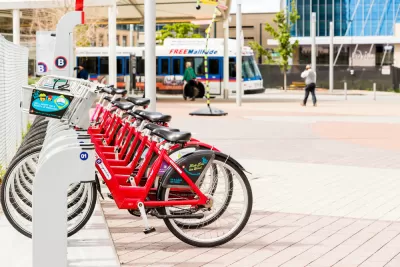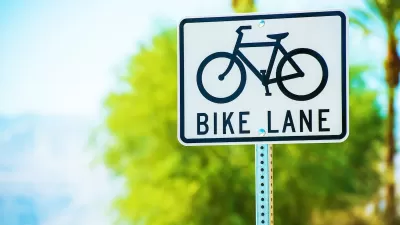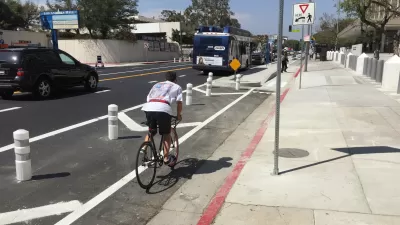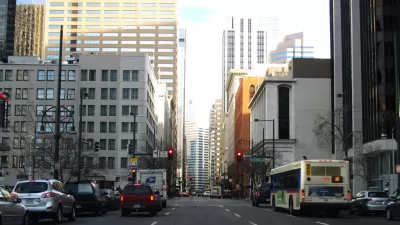The Downtown Denver Partnership found 8.3% of all commuters bike to work—an improvement that the partnership's senior manager of economic development said could be "the most significant change we've ever seen."

An annual survey of downtown Denver commuters found that 8.3% say they bike to work, up from 6.6% a year ago. "The 2017 spike in bike commuting is “one of the most significant, if not the most significant change that we have seen” since the survey began in 2012, said Emily Brett, Senior Manager of Economic Development for the Partnership," David Sachs reports for Streetsblog Denver.
Why the jump? It's hard to say. The city has added more than four miles of protected bike lanes downtown, which may have had an impact. The survey also saw a strong association between employers offering transit benefits and employees riding bikes and transit to work, but the report doesn't offer a "silver bullet" type explanation.
"These statistics are a good weathervane but it’s important to keep in mind that they don’t necessarily reflect citywide trends," Sachs cautions. Of course, commuting isn't the only reason for bike trips (to some, biking for any kind of transport is a foreign concept). And while boosting downtown bike rates is a noble goal for the health and equity of a city, a bump in downtown biking doesn't necessarily reflect city-wide transport use.
FULL STORY: Bike Commuting Surges 25 Percent in Downtown Denver

Alabama: Trump Terminates Settlements for Black Communities Harmed By Raw Sewage
Trump deemed the landmark civil rights agreement “illegal DEI and environmental justice policy.”

Planetizen Federal Action Tracker
A weekly monitor of how Trump’s orders and actions are impacting planners and planning in America.

Why Should We Subsidize Public Transportation?
Many public transit agencies face financial stress due to rising costs, declining fare revenue, and declining subsidies. Transit advocates must provide a strong business case for increasing public transit funding.

Understanding Road Diets
An explainer from Momentum highlights the advantages of reducing vehicle lanes in favor of more bike, transit, and pedestrian infrastructure.

New California Law Regulates Warehouse Pollution
A new law tightens building and emissions regulations for large distribution warehouses to mitigate air pollution and traffic in surrounding communities.

Phoenix Announces Opening Date for Light Rail Extension
The South Central extension will connect South Phoenix to downtown and other major hubs starting on June 7.
Urban Design for Planners 1: Software Tools
This six-course series explores essential urban design concepts using open source software and equips planners with the tools they need to participate fully in the urban design process.
Planning for Universal Design
Learn the tools for implementing Universal Design in planning regulations.
Caltrans
Smith Gee Studio
Institute for Housing and Urban Development Studies (IHS)
City of Grandview
Harvard GSD Executive Education
Toledo-Lucas County Plan Commissions
Salt Lake City
NYU Wagner Graduate School of Public Service





























